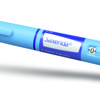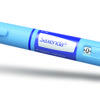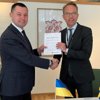Fritextsökning
Artiklar per år
Innehållstyper
-

EU-godkännande rekommenderas för Astra Zeneca-läkemedel för unga
Astra Zenecas läkemedel Soliris rekommenderas av en expertkommitté inom den europeiska läkemedelsmyndigheten EMA för godkännande som behandling av barn och ungdomar med den sällsynta neuromuskulära sjukdomen myastenia gravis.
-

Neanderthal gene variants may cause Viking disease
A new study suggests that the so-called Viking disease, which affects the hand function in many older people, may be linked to gene variants inherited from Neanderthals.
-

Lucy Robertshaw: Artificial intelligence – is this really going to transform a patient’s life?
In a column Lucy Robertshaw reflects on how AI and new regulations will affect healthcare, innovation and the lives of future patients.
-

Gothenburg-based company acquired by Norwegian diagnostics group
Gentian Diagnostics acquires Gothenburg-based Getica.
-

Vikingasjukan kan bero på genvarianter från neandertalare
Den så kallade vikingasjukan, som påverkar handfunktionen hos många äldre, kan vara kopplad till genvarianter nedärvda från neanderthalare, enligt en ny studie.
-

Anna Törner: The minute between life and death
“I have never told anyone about this day that happened more than 20 years ago. But I sometimes reflect on what happened, on what might have happened. When I try to understand why I haven’t told anyone, I find the answer: a feeling of shame. There is no forgiveness for something like this, even though it is very human to be distracted for a moment,” Anna Törner writes in a column.
-

Novo Nordisk invests billions in expanding its production capacity
Danish pharmaceutical company Novo Nordisk is making a major investment to develop and expand its production facility in Hillerød, north of Copenhagen. DKK 15.9 billion, equivalent to almost SEK 25 billion, is being invested over six years.
-

AstraZeneca moves to brewery quarters in central Copenhagen
AstraZeneca in Denmark is moving its business into central Copenhagen and the old brewery quarters in Carlsberg Byen.
-

Nanexa develops depot formulation of the diabetes and obesity drug Saxenda
Uppsala-based company Nanexa has signed an agreement with a German contract research company to start a clinical study with a monthly depot of liraglutide. The drug is currently approved for the treatment of diabetes and obesity.
-

Nanoparticles to help detect pulmonary disease
Nanoparticles behave in a certain way in the air. Using this knowledge, researchers at Lund University have developed a new measurement method for lung examinations based on the phenomenon.
-

Vicore tar in en halv miljard inför studie i lungfibros
Vicore Pharma tillförs en halv miljard kronor i en riktad nyemission. Syftet med kapitaltillskottet är att kunna fortsätta utvecklingen av bolagets behandlingar mot svåra lungsjukdomar.
-

Novo Nordisk vill köpa fransk samarbetspartner
Danska Novo Nordisk har inlett förhandlingar med medtech-företaget Biocorps största ägare om att förvärva samtliga av dess aktier i bolaget. Om affären går i lås planerar den danska läkemedelsjätten att förvärva ytterligare aktier i Biocorp för att köpa hela bolaget.
-

Nanopartiklar ska hjälpa till att hitta lungsjukdom
Nanopartiklar rör sig på ett visst sätt i luft. Med den vetskapen har forskare vid Lunds universitet utvecklat en ny mätmetod för lungundersökningar som bygger på fenomenet.
-

Nanexa utvecklar depåberedning av diabetes- och fetmaläkemedlet Saxenda
Uppsalabaserade Nanexa har slutit ett avtal med ett tyskt kontraktsforskningsbolag för att starta en klinisk studie med en månadsdepå av liraglutid. Läkemedlet är idag godkänt för användning mot diabetes och vid obesitas.
-

This is the future location of the new national innovation cluster
Mölndal and Goco Health Innovation City will be the site of a new national innovation cluster for advanced therapies. The business community and the Swedish government are splitting the costs of the project, which is expected to produce new treatments for common diseases such as cancer and diabetes.
-

Rapid developments in AI – “All stakeholders are struggling to understand it”
Artificial intelligence is being discussed more and more, and developments in the field are moving rapidly. As the Swedish Medical Products Agency testifies, keeping up with developments is not easy.
-

Study: Semaglutide tablet produces weight loss
The pharmaceutical semaglutide is effective for weight loss even when given in tablet form, according to a phase 3 study.
-

Norwegian company wins bidding battle for Sensidose
The lengthy battle to acquire medical device company Sensidose is apparently over. Generic medicines company EQL Pharma is pulling out, selling its shares and leaving the way open for Norwegian company Navamedic.
-

Test ska visa om antibiotika fungerar
En metod utvecklad av forskare från Karolinska insitutet ska kunna hjälpa till att visa om bakterier svarar på en antibiotikabehandling. De har nu startat ett företag för att vidareutveckla tekniken till ett snabbtest.
-

Samuel Lagercrantz: The government’s performance in healthcare and life sciences so far
Since the change of government in Sweden, developments in the healthcare sector have shown promising signs, but the outlook in life sciences is less promising, writes Samuel Lagercrantz in an editorial.
-

Irlab tecknar avtal för utvärdering av neuropsykiatriska läkemedel
Det svenska forskningsbolaget Irlab Therapeutics har ingått ett avtal med McQaude Center for Strategic Research and Development (MRSD). Avtalet avser utvärdering av Irlabs neuropsykiatriska läkemedelskandidater IRL757 och IRL942.
-

Swedish and Ukrainian Medical Product Agencies sign an agreement
The Directors-General of the Swedish and Ukrainian Medical Products Agencies have signed a cooperation agreement.
-

FDA godkänner behandling mot rastlöshet vid Alzheimers
För första gången har amerikanska myndigheter godkänt en behandling mot agitation – ett tillstånd av stark oro och rastlöshet – i samband med demens på grund av Alzheimers sjukdom.
-

The first Lyme disease vaccine faces a delay
Pfizer and Valneva’s Lyme disease vaccine, which could be the first of its kind, is facing delays of about a year. The reason is problems at trial sites in the United States, which have forced the companies to drop half of the participants in an ongoing Phase III study.